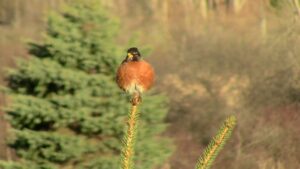Found a Young Wild Bird?
By Glen Wunderlich
Finding wild birds around the house can sure change a birder’s plans. Already this year, there have been a Cooper’s hawk, two blue jays, and several robins that have fallen into our hands. Unfortunately, the Cooper’s hawk appeared to have slammed into a window and its prospects for survival seemed slim. Nonetheless, I put the downed creature into a pet carrier and headed off to Michigan State’s emergency animal hospital, where it was carried away by someone on staff.
It’s good to know that such a service is available. If you have an emergency, call 517-353-5420 or take your pet immediately to the Veterinary Teaching Hospital located at Bogue and Wilson Roads on the MSU Campus.
But, what should we do when we find young birds on the ground and they are unable to fly?
My first thought is always to get them to safety, before a house cat discovers their predicament. We keep a bird cage on hand for such encounters, but it should never be more than temporary housing. They may be cute but keeping a young bird can cause death by the kindness of good intentions; it’s also illegal.
Years ago, a kingbird family was raising its young in a red pine near our house and the parent birds often dive-bombed our Labrador retriever when he was in their neighborhood. It was quite comical to see them attack the “dangerous” dog from behind. But, when one of its young eventually fell from the nest, I knew I was in for an adventure on the ladder. So, before ascending the rungs to the nest site, I donned a construction hard hat. Sure enough. Those birds taught me a bit about pecking order that day.
“They usually spread out along the branch of a tree and call for their parents to bring food to them,” says Ron Stewart, regional conservation outreach manager for the Utah Division of Wildlife Resources. But, sometimes high winds will blow them onto the ground.
Stewart says the best thing to do is get the bird out of the reach of house cats and dogs by placing it on a safe branch. “The baby will squawk,” he says, “and the parents will find it.
“Most birds do not have a good sense of smell, so picking the bird up and placing it on a branch won’t harm it.”
Stewart also says you shouldn’t feed the bird before you place it back in the tree. “Trying to hand feed a young bird is not a good idea,” he says.
Stewart says birds have a specific diet. “Feeding them something that’s not part of their diet could kill them,” he says. “For example, you might be surprised to learn that robins are one of just a few birds that can safely eat worms. Most birds can’t.”
Stewart says the best thing to do is let the bird’s parents feed it. “They know what the bird can and cannot eat,” he says.






